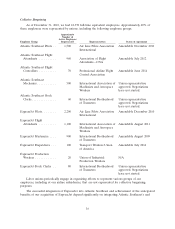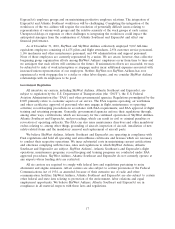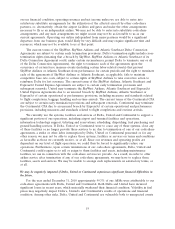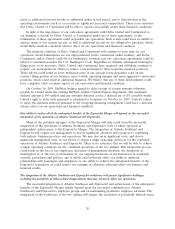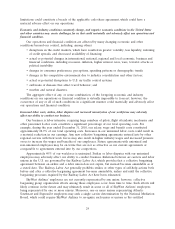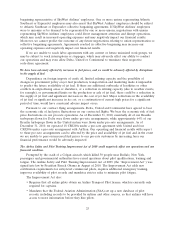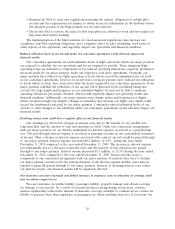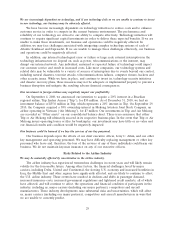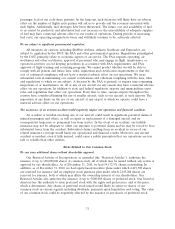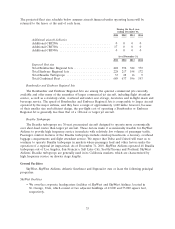SkyWest Airlines 2010 Annual Report Download - page 28
Download and view the complete annual report
Please find page 28 of the 2010 SkyWest Airlines annual report below. You can navigate through the pages in the report by either clicking on the pages listed below, or by using the keyword search tool below to find specific information within the annual report.limitations could constitute a breach of the applicable code-share agreement, which could have a
material adverse effect on our operations.
Economic and industry conditions constantly change, and negative economic conditions in the United States
and other countries may create challenges for us that could materially and adversely affect our operations and
financial condition.
Our operations and financial condition are affected by many changing economic and other
conditions beyond our control, including, among others:
• disruptions in the credit markets, which have resulted in greater volatility, less liquidity, widening
of credit spreads, and decreased availability of financing;
• actual or potential changes in international, national, regional and local economic, business and
financial conditions, including recession, inflation, higher interest rates, wars, terrorist attacks or
political instability;
• changes in consumer preferences, perceptions, spending patterns or demographic trends;
• changes in the competitive environment due to industry consolidation and other factors;
• actual or potential disruptions to U.S. air traffic control systems;
• outbreaks of diseases that affect travel behavior; and
• weather and natural disasters.
The aggregate effect of any, or some combination, of the foregoing economic and industry
conditions on our operations or financial condition is virtually impossible to forecast; however, the
occurrence of any or all of such conditions in a significant manner could materially and adversely affect
our operations and financial condition.
Increased labor costs, strikes, labor disputes and increased unionization of our workforces may adversely
affect our ability to conduct our business.
Our business is labor intensive, requiring large numbers of pilots, flight attendants, mechanics and
other personnel. Labor costs constitute a significant percentage of our total operating costs. For
example, during the year ended December 31, 2010, our salary, wage and benefit costs constituted
approximately 28.9% of our total operating costs. Increases in our unionized labor costs could result in
a material reduction in our earnings. Any new collective bargaining agreements entered into by other
regional carriers with their work forces may also result in higher industry wages and increased pressure
on us to increase the wages and benefits of our employees. Future agreements with unionized and
non-unionized employees may be on terms that are not as attractive as our current agreements or
comparable to agreements entered into by our competitors.
Approximately 40% of our workforce is unionized. Strikes or labor disputes with our unionized
employees may adversely affect our ability to conduct business. Relations between air carriers and labor
unions in the U.S. are governed by the Railway Labor Act, which provides that a collective bargaining
agreement between an airline and a labor union does not expire, but instead becomes amendable as of
a stated date. The Railway Labor Act generally prohibits strikes or other types of self-help actions both
before and after a collective bargaining agreement becomes amendable, unless and until the collective
bargaining processes required by the Railway Labor Act have been exhausted.
SkyWest Airlines’ employees are not currently represented by any union; however, collective
bargaining group organization efforts among those employees occur from time to time. Such efforts will
likely continue in the future and may ultimately result in some or all of SkyWest Airlines’ employees
being represented by one or more unions. Moreover, one or more unions representing Atlantic
Southeast and ExpressJet employees may seek a single carrier determination by the National Mediation
Board, which could require SkyWest Airlines to recognize such union or unions as the certified
24




